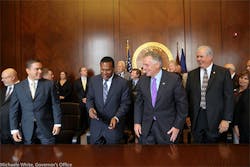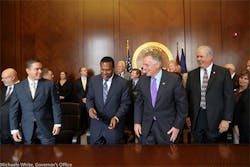You can’t get anything done in Washington, especially in a topsy-tury election year like this one. At least that’s what the experts say.
The experts must have forgotten to tell the Voluntary Protection Program Participants’ Association (VPPPA).
Last week, two U.S. senators on the Health, Education, Labor and Pensions Committee proposed S. 2881, the Voluntary Protection Program (VPP) Act. Senators Michael Enzi (R-WY) and Michael Bennet (D-CO) proposed the bill to make VPP a permanent part of the workplace safety picture under OSHA.
Congressmen Todd Rokita (R-IN) and Gene Green (D-TX) and Congresswoman Martha Roby (R-AL) proposed an identical bill, H.R. 2500, in the House of Representatives last year, and that bill enjoys the support of 31 co-sponsors from both parties. Earlier this year, the Obama administration signaled its support for VPP by proposing budget language to keep the program funded, and Labor Secretary Thomas Perez signaled a desire to expand the program.
VPP recognizes workers and managers who use best practices to enhance workplace safety and health. VPP worksites reduce injuries and illnesses significantly for approximately one million American workers in traditionally hazardous occupations at 2,200 worksites, including 700 participating local unions.
“Worker safety is a bipartisan issue,” said Mike Maddox, chairman of VPPPA. “The workers and businesses that make VPP a success are encouraged to see this level of support from the Administration and Congress.”
Virginia made history last year by passing a bipartisan bill to make it the second state after Indiana to codify VPP at the urging of Gov. Terry McAuliffe (D), with support from the Virginia Chamber of Commerce, the Virginia AFL-CIO, the Virginia Manufacturers’ Association, the American Society of Safety Engineers, the American Industrial Hygiene Association, VPPPA and other safety organizations, and many participating employers and local unions.
You may identify and contact your congressional representatives on this and other important safety legislation by going to www.house.gov and www.senate.gov.
About the Author
Courtney Malveaux
Regulatory, Government Affairs and Employment Attorney
Courtney M. Malveaux is a Principal of Jackson Lewis. P.C., one of the country’s preeminent workplace law firms. He co-leads the firm’s Workplace Safety and Health Practice Group and its Construction Industry Group. His practice focuses on representing employers cited by the Occupational Safety and Health Administration and other regulatory agencies, oftentimes following catastrophic incidents. He also represents business associations in state and federal legislative and regulatory matters, and he has testified before Congressional and state legislative committees on workplace safety and health matters.
Mr. Malveaux represents industry on the Virginia Safety and Health Codes Board. He pulled together a broad coalition of business and safety associations to pass laws in four states to make voluntary compliance a permanent part of a state Occupational Safety and Health Act, and he is pushing similar legislation in Congress. Before joining Jackson Lewis, Mr. Malveaux enforced occupational safety and health laws and other state and federal labor laws as Virginia’s Labor Commissioner while also serving as President of the National Association of Government Labor Officials.


